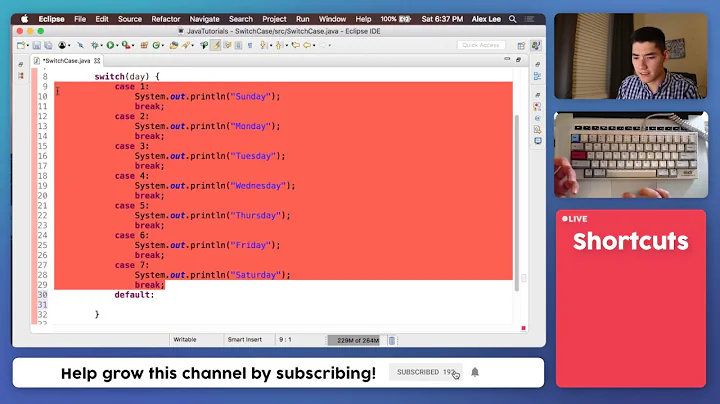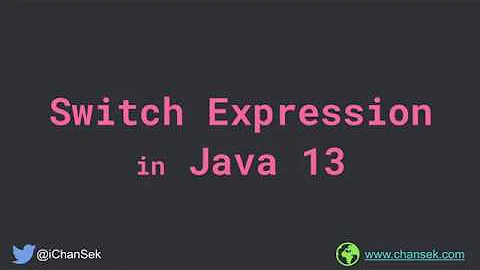A Switch Java problem : case expressions must be constant expressions
Solution 1
So it can be evaluated during the compilation phase ( statically check )
See: http://docs.oracle.com/javase/specs/jls/se7/html/jls-14.html#jls-14.11 for a formal definition of the switch.
Additionally it may help you to understand better how that switch is transformed into bytecode:
class Switch {
void x(int n ) {
switch( n ) {
case 1: System.out.println("one"); break;
case 9: System.out.println("nine"); break;
default: System.out.println("nothing"); break;
}
}
}
And after compiling:
C:\>javap -c Switch
Compiled from "Switch.java"
class Switch extends java.lang.Object{
Switch();
Code:
0: aload_0
1: invokespecial #1; //Method java/lang/Object."<init>":()V
4: return
void x(int);
Code:
0: iload_1
1: lookupswitch{ //2
1: 28;
9: 39;
default: 50 }
28: getstatic #2; //Field java/lang/System.out:Ljava/io/PrintStream;
31: ldc #3; //String one
33: invokevirtual #4; //Method java/io/PrintStream.println:(Ljava/lang/String;)V
36: goto 58
39: getstatic #2; //Field java/lang/System.out:Ljava/io/PrintStream;
42: ldc #5; //String nine
44: invokevirtual #4; //Method java/io/PrintStream.println:(Ljava/lang/String;)V
47: goto 58
50: getstatic #2; //Field java/lang/System.out:Ljava/io/PrintStream;
53: ldc #6; //String nothing
55: invokevirtual #4; //Method java/io/PrintStream.println:(Ljava/lang/String;)V
58: return
}
See that line marked as 1:
1: lookupswitch{ //2
1: 28;
9: 39;
default: 50 }
It evaluates the value and goes to some other line. For instance if value is 9 it will jump to instruction 39:
39: getstatic #2; //Field java/lang/System.out:Ljava/io/PrintStream;
42: ldc #5; //String nine
44: invokevirtual #4; //Method java/io/PrintStream.println:(Ljava/lang/String;)V
47: goto 58
Which in turn jumps to instruction 58 :
58: return
All this wouldn't be possible if it was evaluated dynamically. That's why.
Solution 2
in eclipse IDE is simple ,in switch sentence CTRL + 1 and convert switch sentence - if-else sentence http://tools.android.com/tips/non-constant-fields
Solution 3
The idDirectory and others need to be a constant and not a declared variable. Switch will not work in this case, you need switch to if-else construct.
EDIT I see what OP meant. That is just how switch works in java language.
Related videos on Youtube
Dimitri
Updated on July 09, 2022Comments
-
 Dimitri almost 2 years
Dimitri almost 2 yearsI having a problem in my switch/case statement. The error says : "Case expressions must be constant expressions". I understand the error and I can resolve it using If but can someone tells me why the case expression must be constant in a switch/case. A code example of my error :
public boolean onOptionsItemSelected(MenuItem item) { int idDirectory = ((MenuItem) findViewById(R.id.createDirectory)).getItemId(); int idSuppression = ((MenuItem) findViewById(R.id.recycleTrash)).getItemId(); int idSeeTrash = ((MenuItem) findViewById(R.id.seeTrash)).getItemId(); switch (item.getItemId()) { case idDirectory: createDirectory(currentDirectory); break; case idSuppression: recycleTrash(); break; case idSeeTrash: seeTrash(); break; } return super.onOptionsItemSelected(item); }Thx for your explanation !!
-
Anon. over 13 yearsWhy are you using
findViewById().getItemId()? If you already have the id, you don't need to get the item in order to get the id! -
Bnjmn over 13 yearsswitch statements are a bad smell... I recommend you look into using polymorphism or the adapter pattern in order to achieve better looking code. Additionally you can avoid problems like these altogether.
-
OscarRyz over 13 years@Bnjmn I agree, specially when the condition repeats quite often. If you use it seldom it may be ok. Also, I use it sometimes with polymorphism to create the initial concrete instance.
-
 idbrii over 13 years@Bnjmn: Since Dimitri's using Android, his
idbrii over 13 years@Bnjmn: Since Dimitri's using Android, hisMenuItemobjects are likely defined in xml and (to my knowledge) cannot be easily subclassed without abandoning the simplicity ofMenuInflater.inflate().
-
-
 Will Tate over 13 yearsThis is exactly your problem. If you can't get around this with constants just use a slightly more complex if-then-else-if-blah-blah setup.
Will Tate over 13 yearsThis is exactly your problem. If you can't get around this with constants just use a slightly more complex if-then-else-if-blah-blah setup. -
OscarRyz over 13 years-1 For answering what the OP already knows: I understand the error and I can resolve it using If but can someone tells me why the case expression must be constant in a switch/case
-
 Dimitri over 13 yearsThanks man, that's a nice answer. So if compile with javap, i can see the bytecode generated??
Dimitri over 13 yearsThanks man, that's a nice answer. So if compile with javap, i can see the bytecode generated?? -
OscarRyz over 13 years@Dimitri. You're welcome.
javapis another tool ( like javadoc or jar ) which is the default java dissambler. If invoked with-cyou'll see these instructions. -
 Dimitri over 13 yearsOk. But i was thinking, do you think the bytecode generated in the JVM is the same in Dalvik Machine (Android). I am working on Android as you may see it
Dimitri over 13 yearsOk. But i was thinking, do you think the bytecode generated in the JVM is the same in Dalvik Machine (Android). I am working on Android as you may see it -
OscarRyz over 13 yearsActually... it is not the same. Dalvik has its own codes, but the switch will work the same in both. Take a good look at: en.wikipedia.org/wiki/Dalvik_(software)






